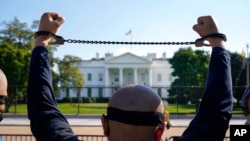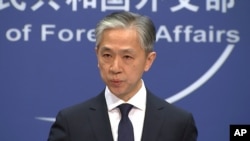Forced labor among Uyghurs, Kazakhs and other ethnic groups in China's Xinjiang Uyghur Autonomous Region and Tibet,Tomoya Obokata(United Nations Contemporary Forms of slavery, according to the Special Rapporteur on the Problem.
The Special Rapporteuris, according to the American Civil Liberties Union, "an independent expert appointed by the United Nations Human Rights Council to monitor, advise and publicly report mandated' for human rights violations in specific countries and around the world.
A report released on Tuesday "Modern forms of slavery affecting people belonging to ethnic, religious and linguistic minority communities," Discovered several cases of forced labor in Tibet. Enslavement.
"In addition, excessive surveillance, abusive living and working conditions, restricted movement due to detention, intimidation, physical and/or sexual violence and other inhuman or degrading treatment , some cases may amount to enslavement as a crime against humanity and deserve further independent analysis," the report said.
It implemented two systems of state mandates to keep people in obedience: among them was a system through vocational training centers where "minorities were bound and subjected to job placement"; It includes methods of “poverty alleviation through labor transfer” by shifting workers to “secondary or tertiary sector jobs,” the report said.
The report also determined that a similar system of forced labor had been established in Tibet. Primarily farmers, nomads and other rural workers were placed in low-skilled, low-wage employment.
Beijing describes these programs as a way to create employment opportunities for minorities to increase their incomes. However, the report says the "involuntary nature of the jobs provided by the affected communities" is often seen in Xinjiang and Tibet.

Some think tanks, rights groups and the United States have accused China of forced Uyghur labor in recent years. In June, the U.S. government implemented the Uyghur Forced Labor Prevention Act, banning the import of products related to forced labor from the Xinjiang Uighur Autonomous Region.
Beijing has long denied accusations of forced labor in Xinjiang, saying that labor arrangements in the region were solely for poverty alleviation and that people of different ethnic groups were free to work.
Reaction from the United States
The Congressional Executive Committee on China reported,in a Twitter post The document "identifies forced labor by Uighurs and Kazakhs," [and] urges countries to conduct due diligence in their supply chains similar to the "Uyghur Forced Labor Prevention Act."
The Washington-based Uyghur Human Rights Project (UHRP) United Nations Office to Prevent Genocide urged an immediate assessment and response to the treatment of Uyghurs and other Turkic ethnic groups in light of the reports of UN experts who allege that they are crimes against humanity.”
Lawsuits against the Chinese government at the level continue to rise," said UHRP Executive Director Omer Kanat. of this scale.
Response from China
On Wednesday, Chinese Foreign Ministry spokesman Wang Wenbin criticized Mr. I chose to," he said. Violate the Code of Conduct of the Special Procedures [and] slander and slander China."

"Certain Special Rapporteur" Wang told a press conference in Beijing that the lies and I decided to believe the disinformation," he said. "There has never been 'forced labor' in Xinjiang. The Chinese government follows the human-centered development philosophy and attaches great importance to protecting workers' rights and interests."
Last Friday At a ceremony held at the International Labor Organization (ILO), China's ambassador to the United Nations ratified two ILO core conventions on forced labor,
on Monday, Wang said. Cheng Shu, Permanent Representative to the United Nations,anddelivered the instrument of ratification of the Forced Labor Convention and the abolition of the Forced Labor Convention to ILO Director-General Guy Ryder.
"These are the most important international legal instruments in the field of eliminating forced labor," Wang said at a press conference in Beijing on Monday. “The Chinese government is consistently opposed to forced labor.


